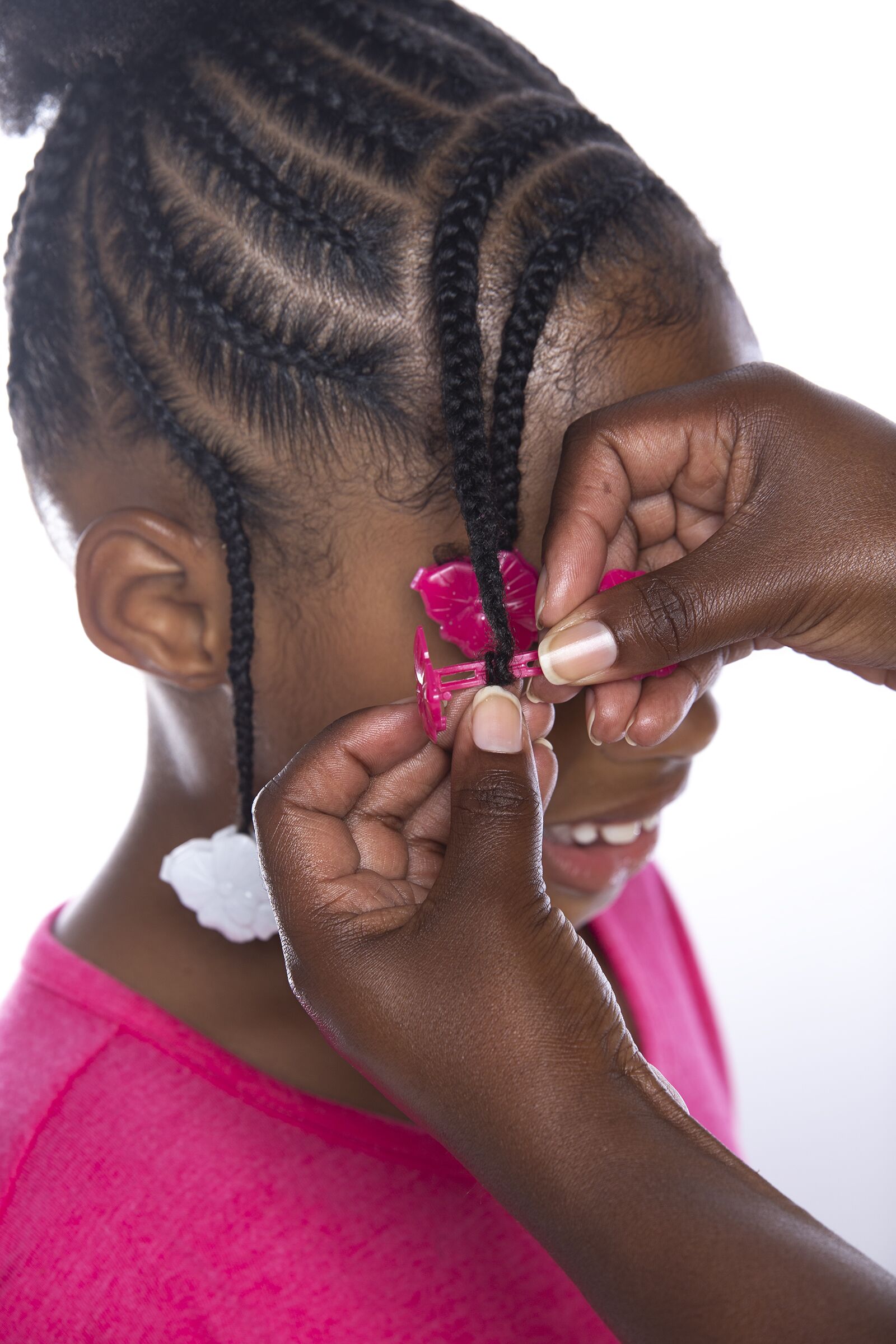 When she was 7 years old, Gabby Goodwin had a BIG problem, her hair bows wouldn’t stay in. Frustrated by constantly losing her clips, Gabby and her mom developed the “Double-Faced Double Snap Barrette”. What started small, slowly grew, and Gabby eventually became CEO of her company. Now, this company includes so much more than just bows for young girls, it also includes a line of plant-based hair care like shampoos and creams. What was once just the simple frustrations of a child, grew into a prosperous and motivating organization.
When she was 7 years old, Gabby Goodwin had a BIG problem, her hair bows wouldn’t stay in. Frustrated by constantly losing her clips, Gabby and her mom developed the “Double-Faced Double Snap Barrette”. What started small, slowly grew, and Gabby eventually became CEO of her company. Now, this company includes so much more than just bows for young girls, it also includes a line of plant-based hair care like shampoos and creams. What was once just the simple frustrations of a child, grew into a prosperous and motivating organization.
Archive for Uncategorized – Page 2
When Mikaila Ulmer was just 4 years old, she had a lemonade stand as a lot of kids do, but she stuck with it. A lemonade stand is something so basic, yet things like that aren’t often considered. What makes her product different is that every purchase of Me & the Bees lemonade is donated to help protect the honeybees. The brands positioning is what makes it so special. A focus on community, and protecting the environment appeals to a lot of people because there’s now engagement and an emotional connection to a purchase. It is inspiring, also, to see a community who recognizes a good idea, and helps to build this wonderful company.
With people who were willing to support her and a product with a purpose, now about 15 years down the line, Mikaila Ulmer is donating 10% of annual profits back to the environment. This goes to prove that even young people can find a purpose and inspire change.
Jack Bonneau – Founder and CEO, Jack’s Stands & Marketplaces, and Teen Hustl
Jack Bonneau learned the value of entrepreneurship at the age of 8. Like many young children in need of money, he started a lemonade stand at his local farmer’s market. “In 12 weeks, I made $900 in profit,” he says. “I never knew anything like that was possible.”
He wanted to help other kids to realize this opportunity, so he launched a one stop shop for children’s commerce. Jack and his father would help local children set up a branded Jack’s Stands & Marketplaces stand for $15. They would spend about 30 minutes helping to get the small operation up and running, then leave for multiple hours while the children operated the stand.
Over the four years that Jack’s Stands was operated, hundreds of kids have operated thousands of stands around his city.
While Jack’s Stands was successful, Jack has been working on a new way to scale his venture and came up with Teen Hustl: a nonprofit organization that gives kids access to the gig economy. “My dad told me that back in the 1980s, millions of teens used to have their own paper routes and babysitting businesses,” Bonneau says. “I was like, Wow! Now, because of the internet, those jobs are being taken by adults. But teens are the most tech-savvy, so why not plug them in to that?” Jack has plans to partner with large corporations and make teen entrepreneurship easy and accessible.
Jack Bonneau is yet another example of what teen entrepreneurs are capable of. He found his passion for entrepreneurship and is selflessly making it more accessible and feasible for teens to explore the magic of entrepreneurship.

Riya Karumanchi’s grandmother is visually impaired. She struggled to navigate through her own home, which caught Riya’s attention and set her on a path of innovation. She came to the realization that the primary tool used by visually impaired individuals known as the white cane had barely changed in the last century, so she set out to change that.
Riya had always been extremely intelligent and motivated throughout her childhood – teaching herself how to code in the fourth grade and participating in countless youth innovation programs in Toronto. In talking to many visually impaired, she noticed a common trend in regard to the white cane: it was effective at identifying obstacles on the ground, but users were still vulnerable to things like errant branches and fallen twigs.
She knew that there had to be a better way and began working on a new technology that would help the visually impaired dubbed: SmartCane. SmartCane uses advanced ultrasonic sensors to identify a wide variety of obstacles and alert the user with vibrations.
With the help of four employees, Riya has raised over $85,000 towards her cause. She says: “Instead of [building] a company that has a valuation of a billion dollars, it’s the person that can impact a billion people,” she explains. “It’s ambitious, but that’s my goal.”
Riya Karumanchi has shown that the need for innovation is everywhere and if you put in the work necessary, success will follow.

From a young age, Maya Penn has had a passion for fashion. After consulting her mother about her plans of creating a sustainable fashion collection, her mother’s response was in part what drove her to pursue her passion. “Figure out how to do that and what you need to accomplish that goal.” says Maya’s mother – and so, her journey began.
At the age of ten, Penn began crafting innovative clothing – ultimately teaching herself HTML and making her own website to sell her apparel. Today her Atlanta-based fashion line, Maya’s Ideas, has 10 employees, and customers around the world. “That first sale was so crazy to me, and still is,” Penn says. “It’s an honor when people like what you create. It keeps me moving forward.”
While Maya still has a passion for fashion, she has found interest in other things, too. Including a nonprofit, Maya’s Ideas 4 the Planet, which distributes eco-friendly sanitary products to women in developing countries. Maya has also joined the fight to get a national women’s history museum built in Washington, D.C., creating an animated short that was presented to congress. After that, she launched an animation studio, has given three ted talks, and is currently working on her second book.
“I’m always pushing myself to do more, but that can take a lot out of you, especially when you’re still trying to figure out who you are,” she says. “You have to find ways to calm yourself. Take a walk. Read a book. Stay grounded. Taking care of yourself makes you a better entrepreneur.”
Maya Penn is a role model for many entrepreneurs. She has been the catalyst for social change around the world and continues to prove that through hard work comes success.

Kenan Pala has always been one to help others. From a young age, he was determined to find ways he could help people in need; volunteering at homeless shelters, soup kitchens and more. The problem? “There are a lot of nonprofits doing great things in San Diego, but many don’t allow kids under the age of 18 to volunteer”.
Due to these age restrictions, Pala was not able to help as much as he wanted to, so he came up with a solution. In 2017, Pala founded nonprofit organization Kids4Community with the goal of helping kids help others. He knew from personal experience that so many kids around San Diego wanted to help but were simply turned away by organizations. “All our events are open to anybody of any age,” says Pala. “If you have the passion, you can come.”
Since its founding in 2017, Pala has helped raise over 1 million dollars for local homelessness causes, while also engaging kids to help out with 5K runs, dinner services, and backpack drives.
Kenan Pla is a testament to what it means to be an entrepreneur. He found a problem, came up with a solution, and executed his plan.

Alina Morse was just nine years old when she began her first entrepreneurial venture — Zollipops. These sugar-free candies were created with a simple yet powerful mission: to prevent childhood tooth decay. The first thing I think of when I hear “sugar-free” is a diet my parents can only dream of maintaining. But Alina took that concept and changed her perspective of who could benefit from this product, helping tackle one of the leading chronic childhood diseases in a innovative way. Now, ten years later, and Zollipops has grown into Zollicandy, a brand that offers not just lollipops, but a long list of sugar-free sweets. Zollicandy shifted the consumer market. These products are different from big candy companies like Mars, Nestle, or Herhsey because of their focus on oral health while still being yummy. What kid would want a lollipop that wasn’t sweet? Alina saw a problem and created an enjoyable solution.
Johnathan Kelly is the maker of squish mellows, Johnathan had gotten his inspiration while being out, and about like any entrepreneur, and found soft stuffed animals in Japan. He enjoyed how cute they were and decided he eventually wanted to make and create one of his own. Squish Mellows was then launched in 2017 and has been selling ever since. I am a huge fan of squish mellows and have obtained around twenty of them in the past year. This brand has created over 3,000 different styles and continues to sell each year. They are large in demand for children and adults! His innovative design has truly changed and shaped the way most people view stuffed animals.

For my final blog post, I’d love to talk about a personally experienced entrepreneurial venture. I worked for six months at a beautiful little cafe called Brazilian Table. This place and the family that began it is very close to my heart. Its story is unique and the epitome of bring people together.
Sylvia Boff was a well-established pianist in Brazil with a love for baking and cooking. She raised two daughters and a son, then once they were grown up, she moved to America to start selling her delicious meals and desserts. The two daughters traveled with her; Mariana got a business degree at Messiah University and Juliana learned English and business at a local community college while running the cafe. Starting up was a process that I was lucky enough to be a part of. I was hired about six months after opening, but so much progress still needed to be done. The stories I could tell of processes trial and error, rearrangement, establishments of new equipment, and the Brazilian culture and language are endless. I was paid minimally but gained ineffable riches in my character development and work ethic and business skills. The real life entrepreneurship I witnessed was chaotic.
Success became possible, not because of perfection, but because of the wonderful environment Sylvia created. She has an extremely welcoming presence, a desire to pour out onto every person she comes into contact with, and an extreme work ethic. Most nights, she’d stay up cooking until about 4 am and then come into the cafe later in the day to restock. The support she gained quickly from the community truly made the entire thing possible. Sylvia is impossible to dislike.
There are so many lessons I could discuss that I gained at my time at Brazilian Table, but a few stand out. One of these is about spirit. People are drawn to passion, personality, and story. Sylvia trained me in customer service to meet guests where they were by welcoming them exuberantly, explaining products, and providing a rich experience that was way more than the food I was serving. I became quickly acclimated to meeting strangers whether they were American and familiar or Brazilian and spoke a language I barely knew. I learned the joy in hard work and how to laugh through inevitable mistakes. I gave my all in my different areas of talent and passion, too. Sylvia let me design all the chalkboards and run the social media. These were priceless opportunities that I would encourage everyone to search for.
I will always look back on my time working at Brazilian Table with so much thanksgiving.
https://braziliantablelititz.com/
Lending a Helping Hand: Hannah Davis and BANGS Shoes
 As it does for many entrepreneurs, Hannah’s story started at a point in her life in which she wasn’t sure where to turn next. She had just finished her contract to teach English in China, and didn’t know what came next – until she decided that she wanted to start a business. Inspired by the canvas shoes worn by Chinese workers, she decided to bring this style to Western markets and started a company called BANGS. Her company sells canvas shoes with creative designs meant to “support people in their adventures”.
As it does for many entrepreneurs, Hannah’s story started at a point in her life in which she wasn’t sure where to turn next. She had just finished her contract to teach English in China, and didn’t know what came next – until she decided that she wanted to start a business. Inspired by the canvas shoes worn by Chinese workers, she decided to bring this style to Western markets and started a company called BANGS. Her company sells canvas shoes with creative designs meant to “support people in their adventures”.
In a TEDxTalk, Hannah Davis spoke about the mission and purpose of the company. She founded the company on the mission of “help”. The company name was inspired by the character for “help” in Mandarin, which reveals the overall mission – which is to help entrepreneurs. As Hannah explained it, her entrepreneurial journey to create shoes to fuel adventure actually helps people overcome financial dependence on third parties through their contribution of 20% of their proceeds to helping entrepreneurs start businesses around the world.
 This company is an amazing example of starting a company with a mission to serve rather than a desire to make profits. Her company is growing exponentially – the company was recently put on Nordstrom.com! We need more companies with this commendable mission to continue helping make the world a better place through unique value propositions.
This company is an amazing example of starting a company with a mission to serve rather than a desire to make profits. Her company is growing exponentially – the company was recently put on Nordstrom.com! We need more companies with this commendable mission to continue helping make the world a better place through unique value propositions.
Copyright © 2025 All Rights Reserved

